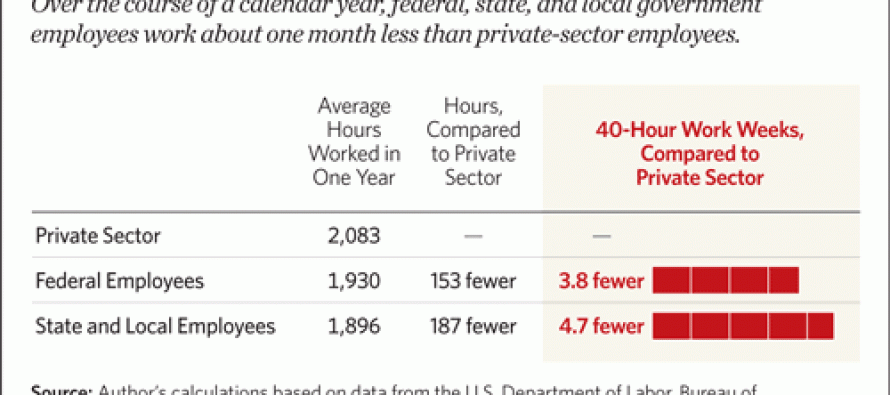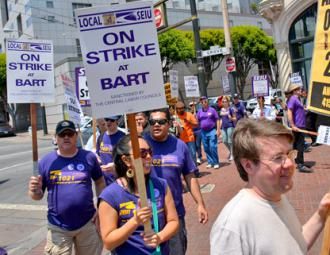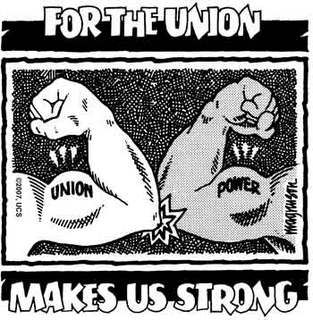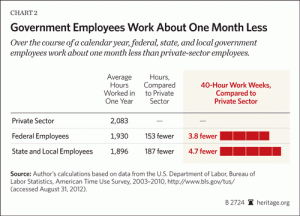BART strike would provide needed clarity on compensation, union power

If I was an advisor to Gov. Jerry Brown, I’d recommend he let the BART strike play out without government intervention. California would be much more governable if voters understood that collective bargaining is holding taxpayers hostage, and more exposure to BART power plays by organized labor can only hammer that home.
 Instead, Brown announced Friday he will seek a court-ordered, two-month cooling-off period if a contract dispute threatens to stall commuter trains in the San Francisco Bay Area. Sunday, he got his way.
Instead, Brown announced Friday he will seek a court-ordered, two-month cooling-off period if a contract dispute threatens to stall commuter trains in the San Francisco Bay Area. Sunday, he got his way.
What does he expect to accomplish with another 60 days? What will negotiators do in 60 days that they cannot do now? This has been going on for months.
The situation is causing a ripple effect on peoples’ lives and on both the Bay Area and the state economies.
A ‘conversation’ about high public pay
Part of the concern surrounding BART is that in many cases the guy “driving” the BART train is making more than the guy sitting in the seat commuting to work in downtown San Francisco.
So if union leadership and sympathizers want to have a “conversation,” let’s have an honest one. The marketplace is out of kilter. According to the Heritage Foundation, private-sector employees work longer hours, and work harder. Private-sector employees typically have better education, and by necessity are entrepreneurial, seek to improve skills for advancement, and do it for about 30 percent less money. And there certainly are far fewer pay, benefit or pension guarantees.
The impetus behind this conversation is not jealousy; most just want public union employees such as BART “drivers” to be paid a fair wage for their skill set based on supply and demand. That’s not what happens in the current collective bargaining paradigm. It typically leaves the taxpayer on the short end of the stick because pay is a function of union power, and in California, unions are awfully powerful.
This is a key reason cities in California have been filing bankruptcy, and why many more are on the brink. Local government simply cannot afford these inflated salaries and particularly the benefits associated with them. Contrary to what union leadership would have us believe, compensation costs are not a minor problem, and there is not an unlimited source of taxpayer funds.
Just the facts, ma’am
The Contra Costa Times has done a stellar job of reporting on the BART strike and negotiations, and even published the data on the salaries of striking BART workers.
Employees from the two striking unions make $78,000 to $81,000 on average annually, including overtime. (This average excludes police and executives at BART which would bring the average pay of a BART employee even higher.)But their gross compensation is much more generous than one might think from those figures. That’s because workers pay only $92 per month for health insurance, regardless of how many dependents are on the plan. And they do not contribute anything toward their pensions.
The unions threatening another strike are Service International Union Local 1021, which represents 1,430 mechanics, custodians and clerical workers, and Amalgamated Transit Union Local 1555, which represents 945 station agents, train operators and clerical workers.
In July, Alicia Trost, BART spokeswoman, “said management has moved a great deal since its initial offer to employees in the talks, which began on April 1,” NBC Bay Area News reported. “She said management initially wanted to ‘take back’ $140 million from employees in wages, retirement costs and health care costs but its most recent proposal would give them an additional $33 million over the next four years.”
Trost also said in July, BART doubled its salary proposal to an 8 percent increase over four years (beyond regular step raises), lowered its pension contribution demand to 5 percent of salary after four years, and cut its medical premium contribution to less than what average public and private sector employees pay.
That’s not remotely good enough for union leaders, who are asking for a 21.5 percent pay increase over three years and want to continue paying just $92 a month for health care and only want to make a 3 percent pension contribution at the end of three years, according to Trost, NBC Bay Area News reported.
Here are the current pay averages, thanks to the Contra Costa Times:
| Average Base* | Median Base* | Average Gross* | Median Gross* | |
| AFSCME | $91,371.29 | $93,060.11 | $104,392.04 | $104,392.04 |
| ATU | $56,184.97 | $62,614.00 | $78,369.22 | $77,782.57 |
| BPMA | $106,271.37 | $109,638.48 | $145,137.39 | $142,576.74 |
| BPOA | $74,170.49 | $77,735.09 | $98,864.11 | $93,940.11 |
| SEIU | $63,529.55 | $73,410.40 | $77,587.35 | $80,504.36 |
| Non-Union | $106,006.04 | $107,768.96 | $110,936.99 | $113,619.45 |
* Averages based on the 2012 pay of employees on the books as of July 2, 2013. Click here for a complete list of 2012 BART employee salaries.
The BART employees may get their increase, but at what cost to their community? To their state? What other costs will go up because of this? Will all transit workers in the state demand the same? One union success provides the impetus for others to gouge taxpayers to satisfy their greed.
The truth? It’s an assault on the middle class
 Allowing BART employees higher salaries and benefits on their already-high compensation will only result in increasing costs and increased fares for the riders.
Allowing BART employees higher salaries and benefits on their already-high compensation will only result in increasing costs and increased fares for the riders.
It’s too easy to negotiate with other people’s money, and even easier to end up giving it away.
The best summary I’ve read on the problem and solution is from a KQED reader who left this comment:
“This debate is between taxpayers and labor. Management has zero skin in the game as does Jerry [Brown](except that he owes the same unions that helped get him elected).
“Strike now — PLEASE. Let’s get on with it and cease this pretense of trying to ‘help’. The sooner we start labor digging into its personal bank account of vacation time and savings to pay day-to-day bills during what — very hopefully — will be a very lengthy and extended strike, the sooner we interject an ounce of common sense into the discussion.
“This the ONLY dynamic which will force labor to re-think its position.
“Anything less is just an attempt to soften taxpayers willingness to pay these guys more.”
Related Articles
Environmental Views: Gray Davis vs. Pete Wilson
Town Hall Los Angeles hosted a discussion between former California governors Pete Wilson and Gray Davis yesterday with the two
San Bernardino attacks shape presidential race
Presidential candidates in both parties have found challenges and opportunities in responding politically to the recent terrorist attacks in San
Hydropower AB 32 scam as bad as one L.A. Times detailed
The Los Angeles Times had a good analysis over the weekend of how AB 32 is being gamed in ways





